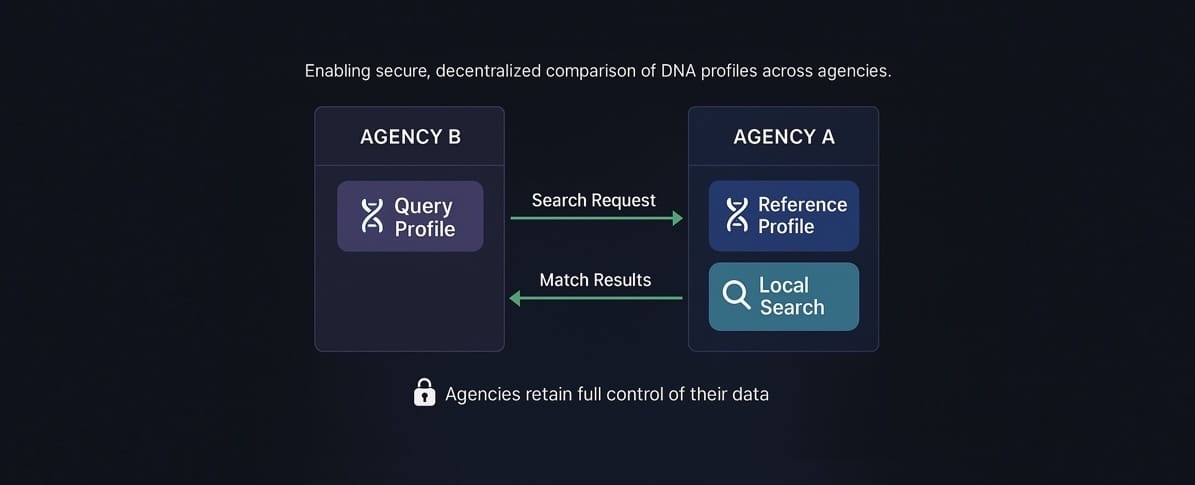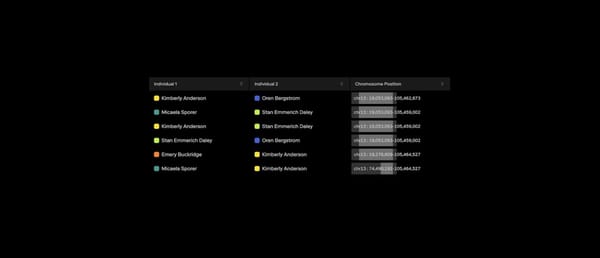Reference testing is an essential part of forensic genetic genealogy investigations. When a promising unknown DNA profile is developed, investigators often compare it to DNA profiles from reference samples provided by potential relatives or individuals associated with a case. These comparisons can confirm hypotheses, rule out possibilities, or help establish identity of the donor of an unknown evidence sample. But despite the importance of reference testing, there at times have been proffered longstanding logistical and/or ethical challenges when different agencies need to collaborate across jurisdictional boundaries.
If one agency holds the unknown profile and another agency holds the relevant reference samples, how can they work together without compromising the privacy, security, or custody of sensitive DNA data? Traditionally, the options have been limited. One agency might upload profiles to an online database. Alternatively, the agency might transfer reference samples or DNA profiles to the other agency to facilitate comparison. Both approaches introduce some risk, related to consent, data control, or legal permissibility.
Earlier this year, our team at Othram introduced SNPSuite, a forensic DNA analysis platform built from the ground up to operate entirely offline. It was designed to give agencies complete control over reference data, enabling secure testing and profile comparison on local or in-house systems. SNPSuite allows users to conduct KinSNP-style pairwise comparisons, visualize SNP profiles, and generate reports, without requiring an internet connection or exposing sensitive reference sample information to external systems.
Earlier this month we started testing a powerful new SNPSuite feature, called SecureSNP™ Search. It enables two agencies to collaborate on a reference search without either party transferring DNA profiles or reference samples. With SecureSNP™ Search, agencies can maintain the privacy and control benefits of an offline system, while still enabling case-critical comparisons across jurisdictions.
Imagine a scenario where Agency A has collected one or more reference profiles for a case under investigation. Separately, Agency B has an unknown profile from an unsolved case. Agency B has reason to believe that the individuals sampled by Agency A might be related to the unknown subject of their case, and they want to know if there is a potential match. In the past, this process would require someone to send profiles somewhere. Either Agency A would share their reference profiles with Agency B, or Agency B would share their unknown profile with Agency A. Alternatively, both parties could upload their data into a shared online system. Each of these options forces one or both agencies to give up custody and control of the DNA data, possibly creating privacy concerns and/or jurisdictional control which in turn present practical barriers to collaboration.
SecureSNP™ Search reduces this barrier. It allows these agencies to work together without moving any DNA profiles. The process is simple and controlled.
Here is how it works:
- Agency B initiates a request to search its unknown profile against the reference profiles held by Agency A. This request is made through SNPSuite and includes case metadata and the purpose of the request. However, the request does not include the actual DNA profile.
- Agency A receives the request and reviews it. If Agency A agrees to facilitate the search, SNPSuite performs the comparison locally, using the reference data that never leaves its system.
- The result of the search is returned to Agency B. No DNA profiles are transferred in either direction.
The search can be executed over the internet, but it operates in a private, peer-to-peer manner. There is no central database, and no other parties are involved in the data exchange. Everything is encrypted, and the agencies retain full visibility and control over what happens. Agency A can decline any request. Agency B does not expose its unknown profile to external organizations. Both agencies preserve the privacy and integrity of their data while still enabling meaningful collaboration.
This system represents a major step forward in empowering inter-agency cooperation without compromising privacy and security. It reflects a growing need in the forensic community: the ability to share information responsibly, with clear boundaries, and only when all parties agree. This new private search preserves the core value that SNPSuite was built on: offline privacy and control, while expanding the toolkit available to investigators working across jurisdictions.
SecureSNP™ Search is currently available to a limited group of partners as part of our beta testing program. Othram is collecting feedback and refining the system prior to a broader release. In the coming months, SecureSNP™ Search will become a core capability of SNPSuite, allowing agencies everywhere to conduct secure, defensible, and private reference comparisons across agencies.
If your agency is interested in participating in the beta test program or learning more about how SNPSuite and our deployed workflow solutions can revolutionize how you approach forensic DNA testing, join our beta program. Also, Othram provides comprehensive training, software, and support to bring forensic SNP testing and forensic genetic genealogy in-house. If you are ready to upgrade your forensic capabilities, then reach out—we will guide you every step of the way.
Privacy and collaboration do not need to be at odds, and with the right tools, both can be enabled, while continuing to deliver answers to the families and communities that need them.






